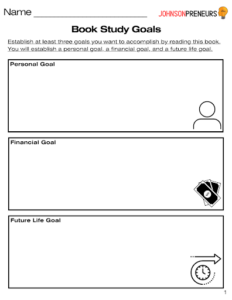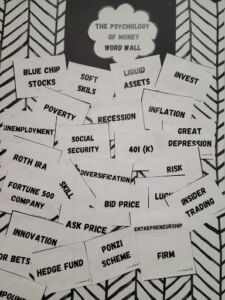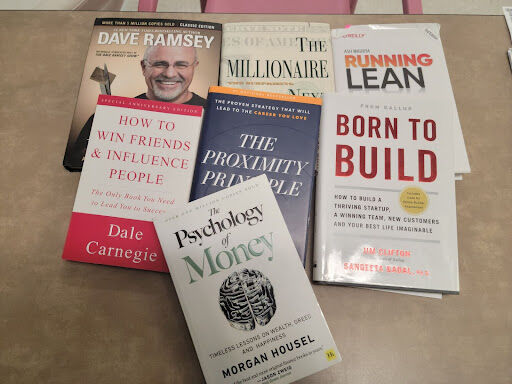It’s a common misconception that reading and “book studies” are only for the academic classes. When thinking about what happens in a Career and Technical Education (CTE) class, people tend to think about hands-on activities and building technical skills used in industry. They aren’t wrong. Those things do happen in a CTE classroom, but, in order to stay on top of innovation and trends in the industry, reading is a must.
“In order to stay on top of innovation and trends in the industry, reading is a must.”
Follow these tips and tricks to hold a successful book study in your CTE classroom.
Explain the difference between fiction and nonfiction
 I always start a book study by explaining the difference between fiction and nonfiction. While there is nothing wrong with fiction (I do love me some Beverly Lewis), CTE classes lend themself perfectly to nonfiction books. I have had students who swear up and down they hate reading and will never enjoy a book study. These students are the ones who end up loving nonfiction books related to their technical career of choice. I have had several students ask for related books they can then read on their own. By the end of last year, I had a group of students (who you would never classify as “readers”) sharing and reading, on their own, Rich Dad Poor Dad. That book is over 300 pages!
I always start a book study by explaining the difference between fiction and nonfiction. While there is nothing wrong with fiction (I do love me some Beverly Lewis), CTE classes lend themself perfectly to nonfiction books. I have had students who swear up and down they hate reading and will never enjoy a book study. These students are the ones who end up loving nonfiction books related to their technical career of choice. I have had several students ask for related books they can then read on their own. By the end of last year, I had a group of students (who you would never classify as “readers”) sharing and reading, on their own, Rich Dad Poor Dad. That book is over 300 pages!
Choose the right book
Choosing the right book is the key to getting your kids hooked on reading. Make sure the book is an easy read, grade appropriate and doesn’t have too much technical jargon (although some is needed to add to our technical vocabulary). If you, as the teacher, could sit down and read the book front to back in a few hours, then it is perfect for a book study that will last a few weeks for your students.
Make sure the book aligns with goals and objectives you are presenting in other lessons in your class. Being able to relate the book to other lessons, activities, or assignments will help drive home the importance of gaining knowledge from reading.
Set objectives and goals
Give the students a preview of what the book is about and have them set their own goals. What do they want to get out of reading this book that will make their life better? How can this book get them ahead in their future careers? Students are interested in answers to these questions. If they can see a potential benefit to their future, they will be interested in what the book has to offer.
“If they can see a potential benefit to their future, they will be interested in what the book has to offer.”
Incorporate the reading in the right way
 I always incorporate the reading into class time and in short digestible segments. If you assign the student to read at home, you will lose them before you even start. We read the book together in class. This can look a number of ways; me reading to the students as they follow along, popcorn reading, or listening to the audio version. Whatever way you choose, make sure you do this in short segments to prevent drifting. I typically don’t do more than one chapter at a time.
I always incorporate the reading into class time and in short digestible segments. If you assign the student to read at home, you will lose them before you even start. We read the book together in class. This can look a number of ways; me reading to the students as they follow along, popcorn reading, or listening to the audio version. Whatever way you choose, make sure you do this in short segments to prevent drifting. I typically don’t do more than one chapter at a time.
Have students take notes as they read
I give each of my students a small notebook to keep with their books. For each chapter, students are instructed to write down key terms (these can be words they don’t know the meaning to or words they believe are important) and key phrases (one liners that stick with you). After we read the chapter, we discuss these terms and phrases.
When it comes to the terms, we discuss the meaning of any of the words they don’t know the meaning of and why certain words are important. These words end up on our “word wall” and become our vocabulary words (more on “word walls” in a later blog). Key phrases can be turned into posters and hung around the room to reflect back throughout the year.
Incorporate discussion questions
After each chapter, I have students pick from a list of discussion questions to answer. This can be done by having students write a short paragraph on the discussion question, having students team up and discuss in pairs or small groups, having a classwide discussion, or virtually with a discussion board. I always have multiple questions that hit on different points made within the chapter. Different students take away different points, this way students can pick a discussion question that really relates to what they took away from that chapter.
Invite guest speakers to the class
Invite guest speakers who are in the industry into your classroom to discuss the topics of the book. They may have different perspectives on the topic and can answer real world questions students may have.
Invite the author of the book to zoom in with your students. While I have yet to have an author agree to this (I will get a “yes” someday), many times they send a short email or video to show the students or free books (woo hoo). These types of interactions can be incredibly memorable.
Make time for personal reflection
Many times when our students finish a book they do a happy dance and move onto the next assignment. Make sure you take the time for students to reflect on what they have read. What did they take away and how does it relate to the goals they set before we began reading? In what way did they grow? How will this new information change the way they live their daily lives? What new interests were sparked? Have students research other books on this topic or subject.
You can create meaningful and engaging book studies in your CTE classroom and develop a passion for reading and learning in students who never thought reading was their “thing.” As J.K. Rowling said, “If you don’t like to read, you haven’t found the right book!”
Some books I incorporated into my classes:
Entrepreneurship and Small Business Classes
Born to Build – Jim Clifton and Sangeeta Bharadwaj Badal
The Proximity Principle – Ken Colemman
Running Lean – Ash Maurya
How to Win Friends and Influence People – Dale Carneige
Personal Finance and Banking Classes
The Total Money Makeover – Dave Ramsey
The Psychology of Money – Morgan Housel
The Millionaire Next Door – Thomas Stanley
The Automatic Millionaire – David Bach
Resources
Please login or register to claim PGPs.
Alternatively, you may use the PGP Request Form if you prefer to not register an account.



